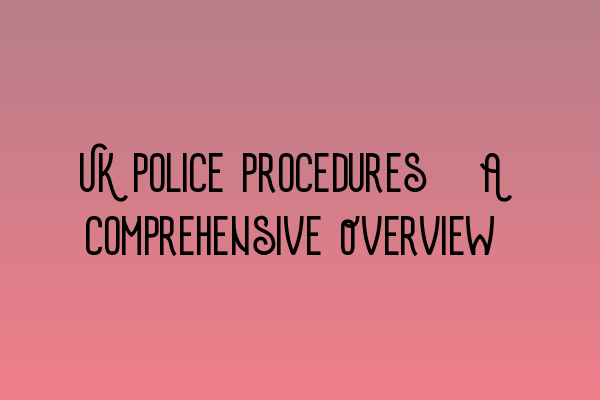UK Police Procedures: A Comprehensive Overview
Introduction
Understanding the intricacies of UK police procedures is crucial for both legal professionals and individuals who find themselves involved in criminal investigations. In this comprehensive overview, we will delve into the key aspects of police procedures in the UK, shedding light on the stages involved, the rights of individuals, and the obligations of the police force.
Key Stages in UK Police Procedures
Police procedures in the UK can generally be divided into several key stages, starting from the initial investigation to the trial. Let’s explore each stage in detail:
1. Investigation Stage
The investigation stage is the initial phase where the police gather evidence, interview witnesses, and collect any relevant information pertaining to the alleged crime. It is during this stage that individuals may be arrested or invited for voluntary interviews. To further understand the investigation process, you may want to check out our related article on SRA SQE Exam Dates for comprehensive information.
2. Arrest and Detention
When the police have reasonable grounds to suspect an individual’s involvement in a crime, they may proceed to arrest and detain that person for questioning and further investigation. It is important to be aware of your rights during this stage, such as the right to legal representation and the right to remain silent. For more information on your rights during arrest, you may find our article on SQE 1 Practice Exam Questions helpful.
3. Interviewing Stage
During the interviewing stage, the police will conduct formal interviews with the individuals involved in the investigation. The purpose of these interviews is to gather further evidence and information. Understanding the dos and don’ts during police interviews is crucial, and our related article on SQE 1 Practice Mocks FLK1 FLK2 provides valuable insights that can help you navigate this stage effectively.
4. Charging and Prosecution
If the police believe there is sufficient evidence to support a conviction, they may proceed to charge the individual with the alleged crime. The case will then be handed over to the Crown Prosecution Service (CPS) for further review and potential prosecution. Understanding the processes involved in charging and prosecution is essential, and our article on SQE 2 Preparation Courses provides in-depth information on this topic.
5. The Trial
The trial is the stage where the evidence is presented before a judge and, in some cases, a jury. The accused has the opportunity to defend themselves against the charges, and the prosecution must prove guilt beyond a reasonable doubt. Familiarizing yourself with the trial process is crucial, and our article on SQE 1 Preparation Courses offers valuable insights into this stage.
